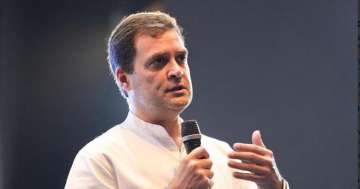Terming the Emergency that was imposed by former prime minister Indira Gandhi a "mistake", Congress leader Rahul Gandhi on Tuesday said what happened during that period was "wrong", but it was fundamentally different from the current scenario as the Congress at no point attempted to capture the country's institutional framework.
In a conversation with Kaushik Basu, professor in the Cornell University in the US and India's former chief economic advisor, Gandhi said he is all for internal democracy in the Congress, which fought for India's independence, gave the country its Constitution and stood for equality.
Asked about his views on the Emergency, he said, "I think that was a mistake. Absolutely, that was a mistake. And my grandmother (Indira Gandhi) said as much."
Asked about Indira Gandhi announcing elections at the end of the Emergency and Pranab Mukherjee telling Basu later that she did so as she thought she might lose and wanted to put that to test, the former Congress chief said there is a fundamental difference between what happened during the Emergency, which "was wrong", and what is happening in the country now.
"The Congress party at no point attempted to capture India's institutional framework and frankly, the Congress party does not even have that capability.
Our design does not allow us that and even if we want, we cannot do it," he said.
Gandhi alleged that the Rashtriya Swayamsevak Sangh (RSS) is doing something "fundamentally different" and filling up the institutions of the country with its people.
"So, even if we defeat the BJP in the election, we are not going to get rid of their people in the institutional structure," he said.
Gandhi recalled a conversation with former Congress chief minister of Madhya Pradesh Kamal Nath before his government was overthrown.
Nath told him that senior bureaucrats in his government would not listen to him as they were RSS people and would not do something that they were asked to do.
"So, it is fundamentally different what is going on," he said.
The Emergency was imposed by Indira Gandhi for a 21-month period from 1975 to 1977, when curbs were imposed on the fundamental rights of citizens.
On internal democracy within the Congress, Gandhi said he is the one who pushed for elections in the party at the Youth Congress and NSUI levels, but was criticised and attacked by his own party leaders.
He wondered why nobody raises questions on why there is no internal democracy in the Bharatiya Janata Party (BJP), the Bahujan Samaj Party (BSP) and the Samajwadi Party (SP) and said such questions are asked about the Congress as it is an "ideological party" and has the ideology of the Constitution. "Therefore, it is more important for us to be democratic," he said.
Asked about how he felt about the death of his father, former prime minister Rajiv Gandhi, in May 1991, he said "it made me understand violence".
Gandhi said he saw his father's death coming as he was fighting many forces at the time.
READ MORE: Group dance, push-ups with students: Rahul Gandhi's day out at Tamil Nadu school
READ MORE: G23 vs Rahul Gandhi? 'Congress becoming weak,' dissenters raise common concern in Jammu
Latest India News
